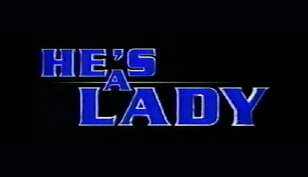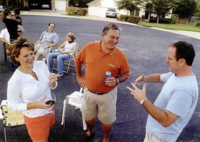
GLAAD is an American non-governmental media monitoring organization. Originally founded as a protest against defamatory coverage of gay and lesbian demographics and their portrayals in the media and entertainment industries, it has since expanded to queer, bisexual, and transgender people.

Boy Meets Boy is an American reality television series broadcast by Bravo. The series premiered on July 29, 2003, and it concluded with its sixth episode on September 2, 2003. Filmed in Palm Springs, the series depicted leading man James Getzlaff selecting a partner among a group of fifteen men, referred to as mates. Getzlaff and the mates participated in one-on-one dates and group activities, with Getzlaff eliminating three mates from the competition in each episode. However, in the fourth episode, it was revealed to Getzlaff that the mates actually consisted of both gay and straight men. If the final mate in the competition was a gay man, he would win a $25,000 reward and a vacation to New Zealand with Getzlaff. Conversely, if the final mate was a straight man, then he alone would win the $25,000 reward. The series was hosted by English television presenter Dani Behr.

Playing It Straight is an American reality television series broadcast by the Fox Broadcasting Company (Fox). The series premiered on March 12, 2004, although it was prematurely cancelled by the network following the broadcast of its third episode on March 26, 2004. Set at the Sizzling Saddle Ranch in Elko, Nevada, the series depicted fourteen men who attempted to pursue a romantic relationship with college student Jackie Thomas. However, this group of suitors was split between men who identified as straight and gay. Through a series of group activities and one-on-on dates, Thomas was required to eliminate men from the competition who she believed identified as gay. If the final suitor was a straight man, he and Thomas split a reward of $1 million. Conversely, if the final suitor was a gay man, he alone won the reward. The series was hosted by American television presenter Daphne Brogdon.

He's a Lady is an American reality television series broadcast by the Turner Broadcasting System (TBS). The six-episode series premiered on October 19, 2004, and concluded on November 23, 2004. Filmed in Los Angeles, California, the series depicted eleven cisgender men in competition for a $250,000 reward over who could pass themselves off as a more convincing woman. The contestants were required to cross-dress and adopt feminine personas, which were then introduced to their family and friends. The contestants additionally competed in weekly challenges that required them to embrace femininity. The competition culminated in a beauty pageant, which was judged by a celebrity panel. The series was hosted by American television presenter Tony Frassrand.
RTL is a Croatian free-to-air television network founded on 30 April 2004. It was owned by the RTL Group from 2004 to 2022. Since 1 June 2022, it is owned by the CME Group. It is the second commercial television network in Croatia that has a national concession, following Nova TV.

The GLAAD Media Award is a US accolade bestowed by GLAAD to recognize and honor various branches of the media for their outstanding representations of the lesbian, gay, bisexual and transgender (LGBTQ) community and the issues that affect their lives. In addition to film and television, the Awards also recognize achievements in other branches of the media and arts, including theatre, music, journalism and advertising.
Super RTL is a German free-to-air television network owned by RTL Deutschland. The channel originally launched in 1995 as a joint venture between RTL Group predecessor company CLT-UFA and Disney's Buena Vista International Television Investments division.
Circle C Ranch is a large master-planned community in southwest Austin, Texas, USA. Development of Circle C Ranch began in 1982, with the first homes in the community in built in 1986. During development, the subdivision was featured prominently in a long and contentious environmental legal battle regarding urban development in the vicinity of Barton Springs and over Edwards Aquifer. The controversy surrounding its development and later annexation by the city of Austin was a landmark in municipal annexation rights in Texas.

LGBT representation in children's television is representation of LGBT topics, themes, and people in television programming meant for children. LGBT representation in children's programming was often uncommon to non-existent for much of television's history up to the 2010s, but has significantly increased since then.

Inka Bause, also !nka or INKA, is a German schlager singer, TV presenter and actress. Her father was Arndt Bause.
Seriously, Dude, I'm Gay is an unaired American reality television special planned for broadcast by the Fox Broadcasting Company (Fox). The two-hour special was set to premiere on June 7, 2004, although it was abruptly removed from the Fox schedule only eleven days before its planned broadcast. Filmed in West Hollywood, California, the special depicted two straight men in competition for a $50,000 reward over who could pass themselves off as a more convincing gay man. The contestants were required to move into separate lofts with gay roommates, come out to their best friends, and socialize at gay nightclubs, in addition to competing in a variety of daily challenges. The special was hosted by Irish television presenter Amanda Byram.
The GLAAD Media Award for Outstanding Drama Series is an annual award that honors drama series for excellence in the depiction of LGBT characters and themes. It is one of several categories of the annual GLAAD Media Awards, which are presented by GLAAD—an American non-governmental media monitoring organization founded in 1985, formerly called the Gay & Lesbian Alliance Against Defamation—at ceremonies in New York City, Los Angeles, and San Francisco between March and June.
The GLAAD Media Award for Outstanding Comedy Series is an annual award that honors comedy series for excellence in the depiction of LGBT characters and themes. It is one of several categories of the annual GLAAD Media Awards, which are presented by GLAAD—an American non-governmental media monitoring organization founded in 1985, formerly called the Gay & Lesbian Alliance Against Defamation—at ceremonies in New York City; Los Angeles; and San Francisco between March and June.
The GLAAD Media Award for Outstanding Limited or Anthology Series is an annual award that honors miniseries and anthology series for excellence in the treatment of LGBT characters and themes. It is one of several categories of the annual GLAAD Media Awards, which are presented by GLAAD—an American non-governmental media monitoring organization—at ceremonies held primarily in New York City and Los Angeles between March and May.

My Husband's Not Gay is an American reality television special broadcast by TLC. Filmed in Salt Lake City, Utah, the one-hour special premiered on January 11, 2015. The special followed four Mormon men who are attracted to men but do not identify as gay. The special depicts one of the men's search for a wife while the other three men, who are married to women, navigate their unconventional relationships.
The depiction of LGBTQ characters in Western animated series in the 2000s changed significantly from the previous decade. This included series such as Queer Duck, the first animated TV series with homosexuality as a predominant theme, The Boondocks, American Dad, bro'Town, W.I.T.C.H., The Venture Bros., Rick & Steve: The Happiest Gay Couple in All the World, Moral Orel, Lizzy the Lezzy, and many others would include LGBTQ characters.
This article features the history of the representation of lesbian, gay, bisexual, transgender and queer (LGBTQ) characters in animated productions under The Walt Disney Company, including films from the studios Walt Disney Animation Studios and Pixar, and programming from the Disney Branded Television channels as well as the streaming service Disney+. From 1983 onward, Disney struggled with LGBTQ representation in their animated series, and their content often included LGBTQ stereotypes or the content was censored in series such as Blazing Dragons. Some creators have also criticized Disney studio executives of cutting LGBTQ scenes from their shows in the past, or criticized that their shows were not seen as part of the "Disney brand", like The Owl House.









